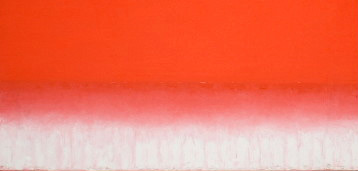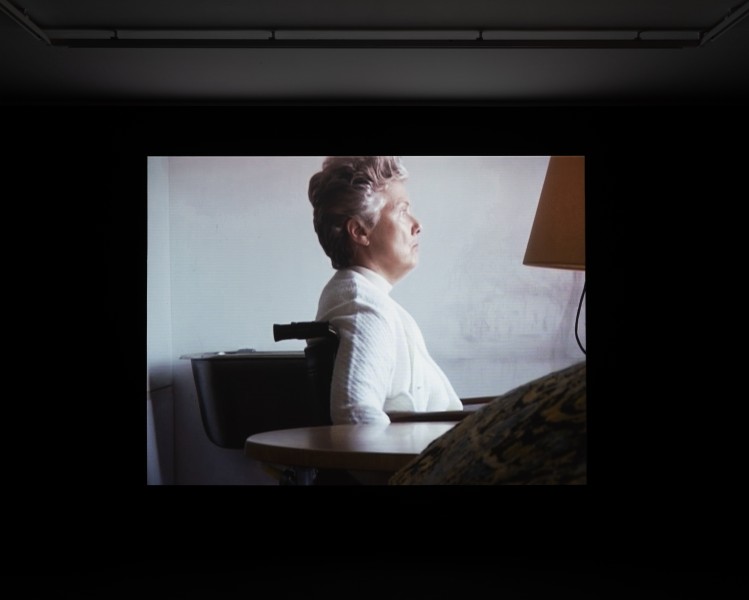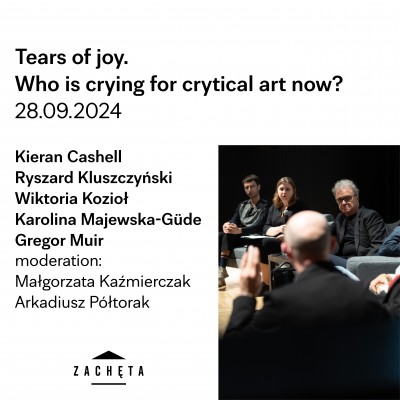Tears of Joy. Who is crying for critical art today?
Zachęta | Cinema Room (entrance through the exhibition)
admission with a ticket
„Who are exhibitions made for? Whose stories do they tell and who is not represented in them and feels out of place in an art gallery? What role should the institution play today and what needs should it respond to?’ - These were the questions posed by the curators of the Tears of Happiness exhibition. However, as critical commentary arose from the artists and theorists taking part in the performance programme, the questions began to multiply. The performers, as well as the audience, pointed to issues that seem problematic today: the way old age and illness are portrayed; the objectification of a loved one; the portrayal of people with dysfunctions as curiosities, flawed and out of sorts; approaches to the rights of non-humans, animals. A group of female artists, theorists, activists sent a letter requesting the burial of the animal remains from Katarzyna Kozyra's work The Pyramid of Animals. The Young British Artists, or YBA for short, employed similar artistic strategies in the 1990s. How were they influenced by the different economic and social conditions in the two countries: in Britain it was the crisis, triggered by the sudden deregulation of the financial markets in 1986, while in Poland it was the turbulent process of political transformation after 1989. Have discussions on the achievements of the YBA swept through in the UK? What impact did the institutionalisation and commercialisation of the works have on them? Which of their activities have changed the art landscape? And which ones would we prefer to forget?
A discussion on the shadows and glories, inconsistencies and continuities of both formations will be led by representatives of the AICA, which is co-organising the event.
Guests:
Kieran Cashell
Is an educator at Limerick School of Art & Design (LSAD) Technological University of the Shannon (TUS): Midwest and author of Aftershock: The Ethics of Contemporary Transgressive Art (I.B. Tauris 2009) and Photographic Realism: The Art of Richard Billingham (Bloomsbury 2020). Cashell has also contributed to academic journals such as Punk & Post-Punk and The British Art Journal.
Ryszard Waldemar Kluszczyński
Media expert, culture expert. In 1976 he graduated from the University of Łódź, where he received his doctoral degree in 1987 on the thesis ‘Film in views of the European avant-garde of the silent film period’, written under the supervision of Alicja Helman. He received his postdoctoral degree in 1999 on the thesis ‘Film-video-multimedia. The Art of the Moving Image in the Electronic Age’; in 2003 he was awarded the title of professor. Since 2002, he has been Head of the Department of Electronic Media in the Department of Media and Audiovisual Culture at the University of Łódź. He also lectures at the Academy of Fine Arts in Łódź (Department of Visual Arts) and the Academy of Fine Arts in Poznań (Department of Multimedia Communication). Specialises in electronic media and interactive art. Lectures on art theory, contemporary culture, film, (multi)media, communication theory and information society issues. He has taught temporarily at a number of American and Western European universities. He is also curator of (multi)media art exhibitions and presentations (video and multimedia department) at the Centre for Contemporary Art at Ujazdowski Castle in Warsaw. He organises exhibitions, permanent shows and the LAB series of international exhibitions. He is the author of books and publications devoted to the history of avant-garde film, video art, multimedia and cultural transformations in the age of electronic communication.
In 1999, he was the first to define the strategies of ‘critical art’ as ‘radical art, especially art that is critical not only of artistic standards but also of cultural and social norms’.
Wiktoria Kozioł
Art historian (PhD at the Faculty of History of the Jagiellonian University), critic, researcher. For the last 12 years, she has been developing pedagogical activities in the field of education related to the history and psychology of art. She currently teaches at two universities. She is the author of more than 50 critical articles and over a dozen scientific texts. Her dissertation was devoted to Polish critical art.
Karolina Majewska-Güde
She holds a degree in Art History from Adam Mickiewicz University in Poznan and a degree in Visual Histories from Goldsmith College in London. In 2019, she defended her dissertation at the Department of Art History and Visual History at the Humboldt University in Berlin, done under the supervision of Prof. Dr. Susanne von Falkenhausen. From 2019 to 2021, she worked as an assistant professor at the Institute of Art History and Theory at the Faculty of Philosophy and Art History of the Catholic University of Linz. She is currently working at the University of Warsaw Her research focuses on art in Central and Eastern Europe after 1945, feminist epistemologies, performance art and issues of circulation and knowledge production through art-based research. Majewska-Güde is co-founder of the research collective writes/speaks/does, combining perferential and interpretative research, which aims to organise exhibitions and workshops on artistic research practices and art archives.
Gregor Muir
He manages Tate's international art collection and is responsible for the acquisition of works from around the world created after 1900 for the National Collection. At Tate, he also develops the collection's strategy and oversees the funding units, such as Tate's Regional Committees for International Acquisitions, which allocate funds for the acquisition of new works. He is involved in the preparation of temporary exhibitions and collection displays; in 2019 he curated the Andy Warhol exhibition at Tate Modern. Prior to 2017, he was Managing Director at the Institute of Contemporary Arts on The Mall. From 2004 to 2011 he worked at the commercial gallery Hauser & Wirth. From 2001 to 2004 he was curator of the Tate's Kramlich Collection. From 1997 he ran the non-profit gallery Lux Gallery in Hoxton Square.
Gregor Muir is the Director of Collections for International Art at Tate, and is responsible for the acquisition of international art works post-1900 for the National Collection. Muir is responsible for guiding the Tate collecting strategy, as well as working across a range of funding sources, such as Tate’s international regional acquisition committees where funds are allocated toward the acquisition of new art from around the world. Muir also works on Tate exhibitions and collection displays, having curated the 2019 Andy Warhol exhibition at Tate Modern. Prior to 2017, he was the Executive Director of the Institute of Contemporary Arts on The Mall. Between 2004 – 2011, Muir worked at the commercial gallery Hauser & Wirth. Between 2001 and 2004, he was the Kramlich Curator of Contemporary Art at Tate. From 1997, Muir ran the not-for-profit Lux Gallery in Hoxton Square.
The discussion will be moderated by:
Małgorzata Kaźmierczak
Doctor of History. Since 2004, she has been an independent curator of artistic events in Poland and the USA, especially devoted to performance art. Author of texts on art and editor of scientific monographs. Since 2011 editor and translator of the English-language art portal livinggallery, from 2012 to 2014 editorial secretary of the scientific journal Art and Documentation. From 2014-2016 director of the Jan Tarasin Art Gallery in Kalisz, 2016-2017 director of the Mediatheque at the Academy of Art in Szczecin and lecturer at the Department of History and Theory of Art, Faculty of Painting and New Media. Currently adjunct professor at the University of the Commission of National Education in Krakow. She has also been vice-president of AICA Poland and AICA International since 2020. She currently holds the office of President of AICA International.
Arkadiusz Półtorak
Researcher, curator and critic of contemporary art; graduate of the Interdepartmental Studies in the Humanities at the Jagiellonian University, doctoral studies in cultural studies at the Faculty of Polish Studies at the Jagiellonian University and De Appel Curatorial Programme. Assistant professor in the Department of Performance Studies at the Jagiellonian University. Co-founder of the independent space for contemporary art and music ‘Elementarz for city dwellers’ in Krakow. Author of the book ‘Concrete Abstractions. Tactics and affirmative strategies in contemporary art'. President of the AICA Polish Section in the term 2023-2026.


